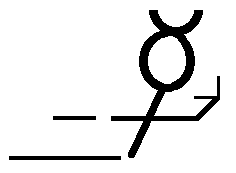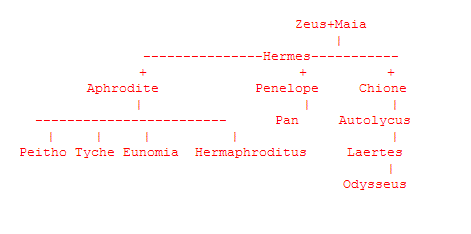|
 |
Hermograph Press presents
Our Company's Patron Deity....
|
Hermes
The Gods work in mysterious ways....but sometimes they just gotta get
the message across pretty bluntly. So, in absence of some kind of
Olympus Email, Facebook or Twitter, who are they gonna call but the
chief messenger! In Greek mythology, that was Hermes. In later years,
the Romans called that god Mercury.
As a god, he was the swiftest--nobody could get there faster than
Hermes. When the planets were given names related to the gods, back in
the ancient days of Greek astronomy, the fastest planet was named for
the winged one.
BIOGRAPHY
Hermes is the son of
Zeus, chief of the gods, and Maia, goddess of clouds and one of the
Pleiades, the seven daughters of Atlas. He was born in Arcadia, near
the mountain Cyllene, and was washed by nymphs at the mountain Tricrena,
also in Arcadia. While some babies enjoy rubber duckies, Hermes'
holy-bird was Gallus, the cock or rooster (appropriate, a messenger of
sorts). The ram (as in Aries) is also considered one of Hermes'
favored pets.
A precocious youth, he stole a herd of cows from Apollo, a mere five
minutes after he was born.
From some of the cows' internal guts, er, fibers, young Hermes put
together the lyre, a kind of handheld harp, upon which Apollo made the
best music in the universe. On this basis, Hermes became the patron of
tricksters and thieves, and was forgiven for his transgression by
Apollo. For himself, Hermes made the shepherd-pipe, similar to
the pipes used by his future son, Pan.
No wife of Hermes has been clearly identified. He, apparently, was
rather promiscuous, but then, so were all the rest of the Greek gods.
Liaisons with the goddess of love and beauty, Aphrodite, another
offspring of Zeus, produced a daughter, Peitho, the personification of
persuasion and seduction. They had at least two more daughters,
Tyche and Eunomia, and a son, Hermaphroditus, an offspring having a
great relationship with both his masculine and feminine sides. In
some mythological stories, the two Olympians also were parents of Eros,
though this is disputed.
A liaison with Penelope produced a son, Pan. This personage is, of
course, well known as the pipe-playing god of shepherds, and if not as
quick as Dad, was definitely a swift runner.
As befits the patron of thieves, another son, Autolycus, the offspring of Chione and
Hermes, became a great thief, and the grandfather of hero,
Odysseus. Hermes later helps rescue his great-grandson (twice)
from harm during the latter's 10-year, post-Trojan War "Odyssey."
The Bacchus-like Silenus is sometimes claimed to be Hermes' son and
Pan's brother; some legends say he is Pan's son. And there are many
more sons and daughters, including some of the Argonauts. Hermes....was
no hermit.

RESIDENCES
After changing heavenly citizenship (from Egyptian deity to Greek), his
Egyptian center of worship became known as Hermopolis. In Rome
he had a temple near the Circus Maximus, on Aventine Hill. It was
the site of a trade fair. Mercury also had a well near the Porta
Capena. Among the Celtics and Germans existed cults of Mercury
worshippers.
CELEBRATIONS
The principal holiday for the merchant god was Mercuralia, May 15th (Drat! Missed it!).
As one of the five "moving stars" or "planets", Mercury's name is the
origin of "Wednesday." In French, this is 'mercredi', coming from the
Latin 'Mercurii dies', or Mercury's day.
WORK HISTORY
Hermes served as messenger for Zeus (though sometimes he job-shares with
Iris, the goddess of the dawn) and as the some-time conductor of souls
of the dead to Hades. He was also known as "the guide and giver of
good." Mercury, As one of Jupiter's favorites, he was considered
the most entertaining, the most shrewd and the most resourceful
god. When Jupiter tired of Olympus, he chose Mercury to accompany
him on forays to Earth, both disguised as mortals.
In his job as messenger, he wears a broad-rimmed traveler's hat--called a
petasos or petasus-- and talaria, or winged sandals, made "of
imperishable gold which bore him swift as a breath of air over sea and
earth," and carries a caduceus or herald's staff around which serpents
or ribbons may be found. The caduceus is said to be able to charm men's
eyes to sleep. He also carries a purse (more like a money-bag
actually....). The purse signifies his role as the Greek god of riches,
trade and good fortune and the Roman god of trade, profit, merchants and
travelers. He took over the latter job from the Dei Lucre, early
Roman deities of commerce (from which, I suspect, comes the phrase
"lucrative"). Hermes also changed his name to Mercury at this
time. Among his personal favorite commercial activities was the
corn trade. Mercury's relationship to business and speed survive
in words like "mercurial and mercantile." Because of his speed he
is sometimes considered a god of the winds.
To the Babylonians he was viewed as the bearer of riches. To the
astrologers of the Renaissance he was the bringer of misfortune.
SYMBOL
 Mercury's
`corporate logo' is often described as representing the messenger's
caduceus or wand with two snakes curled around it. In some
versions of the logo's origin it is said to be Mercury in his winged hat
or petasos. Mercury's
`corporate logo' is often described as representing the messenger's
caduceus or wand with two snakes curled around it. In some
versions of the logo's origin it is said to be Mercury in his winged hat
or petasos.
TRADE NAMES
To the Germans, he was Wodan.
To the Greeks, he was also known as Alipes (the one with winged
feet).
To the pre-Roman Etruscans, he was Turms, guide of the deceased to the underworld, and messenger of
the gods.
To the Egyptians, he was known as messenger of the gods, Thoth. As
such, he was the origin of the deity Hermes Trismegistus, or
"Thrice-great Hermes." The three-part title comes from this
version of Hermes being the Greek writer of astrological
texts--responsible for occult arts including alchemy--the Egyptian god
who invented hieroglyphics and calendar-keeping, and also a judge of the
souls of the deceased.
To the Sumerians, he was Gud, a god favoring welcome rains, agricultural fertility and harvest
abundance.
To the and Assyrians, he was Nabu, the "herald." Instead of being
the messenger of the gods, he was the heavenly secretary, keeping track
of the words of the gods. This also made him the Assyrian god of
knowledge and the recorder of fate for people for the next year.
OTHER WORK EXPERIENCE
Taught the Thriae, winged female spirits who live on Mount Parnassus, the art of prophesy.
At Zeus' command, disguised himself as a goatherd, sang the 100-eyed
Argus (guarding Zeus' ex-lover Io whom Zeus had changed to a cow so Hera
wouldn't know about his extra-marital affair--got all that?) to sleep,
killed him but failed to bring back Io.
Taught the curious Pandora the art of persuasion.
Music teacher to Amphion, a stepbrother via Zeus. Amphion later changed careers to engineering,
building the walls of Thebes.
Delivered Zeus' command to Hades to release Persephone so that
the mourning earth could once again bear life. (Another legend says
Hermes later, er, had a relationship with Persephone).
Mercury delivered Jupiter's command to Aeneas, the Trojan
equivalent to Odysseus, to leave his new love, Dido, at Carthage
and journey on (eventually to Italy where he founded the Roman Empire).
Helped Perseus plan and slay Medusa, including giving him the
sword needed to cut off Medusa's head, guiding him through the
Hyperboreans' land where most travelers perish, and flying him
personally to the land where the Gorgons slept.
Helped the war god Ares escape from the chains in which Otus and Ephialtes, two Giants, had
ensnared him.
Brought the word of Zeus to Calypso to release Odysseus to let him return to his wife.
Before that, he met his grandson at the home of Circe and gave
him an herb allowing him to drink and eat anything she gave him without
harm, thereby causing Circe to fall in love with Odysseus and to give
him all the aid he and his men needed to continue home.
Taught Horge, daughter of Zeus, goddess of seasons, and waitress of the sun-god.
Answered the prayer of the mother of Phrixius, a would-be human
sacrifice, sending a ram with fleece of pure gold to carry him to
safety.
Gave an after-death encore at life to Protesilaus, the first
Greek to land at, and die at, Troy. During his funeral, Hermes allowed
him to attend, to comfort his grieving widow, but this wasn't really a
comfort and she chose to kill herself when he went back down to Hades
afterwards.
Mercury brought the mortal Psyche (synonymous with Soul) to Mt. Olympus so she could marry Cupid.
In one of the best known legends (related to us by Ovid), Mercury
and Jupiter disguise themselves as beggars in the land of Phrygia.
Only one house offered them hospitality and shelter, that of an elderly
couple, Baucis and Philomen. For their kindness and as punishment
to the country that had turned the gods away, the land was cleansed of
the citizens by a flood, the hovel was turned into an ornate temple, and
the couple into priests. When they died, the faithful pair died
together, forming a linden and an oak tree, growing from a single trunk.
As Hermes Trismegistus he authored the Hermetic Books, an
astonishing 36,525 volumes of magic and wisdom, and Egyptian history.
You'd think with this kind of early sales bonanza, someone, somewhere
would still have a copy, yet despite this huge number, no volumes are
known to exist today.....
Research for this page was gathered from:
- Edith Hamilton's classic "Mythology, Timeless Tales of Gods and Heroes," Mentor Books, 1942
- "Bullfinch's Mythology: The Age of Fable", Mentor Books, 1962
- The Encyclopedia Mythica
- E.C. Krupp's article on Mercury lore in the March 1998 Sky and Telescope magazine,
Page 88.
Return to All Things Mercury!
(C)2025 Hermograph Press | Contact
2135 Interstate Drive, #130, Opelika, AL 36801 USA
Phone: +1-404-702-8147
Navigate to: Top | Hermograph Press | World Books | The Galactic Times Newsletter | Store
|
|